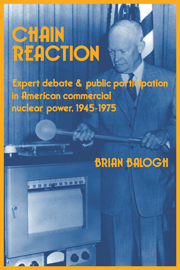 Chain Reaction
Chain Reaction Book contents
- Frontmatter
- Contents
- Acknowledgments
- List of abbreviations
- 1 From fission to fusion: professionalization and politics in twentieth-century America
- 2 The promise of the proministrative state: nuclear experts and national politics, 1945–1947
- 3 Forging an iron triangle: the politics of verisimilitude
- 4 Triangulating demand: the Atomic Energy Commission's first decade of commercialization
- 5 The centrifugal push of expertise: reactor safety, 1947–1960
- 6 The magnetic pull of professional disciplines, issue networks, and local government
- 7 Nuclear experts on top, not on tap: mainstreaming expertise, 1957–1970
- 8 Nuclear experts everywhere: the challenge to nuclear power, 1960–1975
- 9 Conclusion: harnessing political chain reactions
- Index
6 - The magnetic pull of professional disciplines, issue networks, and local government
Published online by Cambridge University Press: 07 May 2010
- Frontmatter
- Contents
- Acknowledgments
- List of abbreviations
- 1 From fission to fusion: professionalization and politics in twentieth-century America
- 2 The promise of the proministrative state: nuclear experts and national politics, 1945–1947
- 3 Forging an iron triangle: the politics of verisimilitude
- 4 Triangulating demand: the Atomic Energy Commission's first decade of commercialization
- 5 The centrifugal push of expertise: reactor safety, 1947–1960
- 6 The magnetic pull of professional disciplines, issue networks, and local government
- 7 Nuclear experts on top, not on tap: mainstreaming expertise, 1957–1970
- 8 Nuclear experts everywhere: the challenge to nuclear power, 1960–1975
- 9 Conclusion: harnessing political chain reactions
- Index
Summary
The interdisciplinary nature of the Advisory Committee on Reactor Safeguards exerted several crosscutting pressures. The most obvious was the committee members' tendency to perceive problems through the lens of their own discipline. That made achieving internal consensus more difficult. The interdisciplinary nature of the committee also eventually attracted professional networks that radiated out from each of the committee's members. In the United States, the dense organizational fabric and porous administrative structure promoted a high degree of professional cross-fertilization. Professionals were intensely committed to issues defined by their discipline. Their interaction across agency boundaries eventually subjected nuclear power to organizational missions far different from those of the AEC. Although the Atomic Energy Commission actively sought to build an iron triangle to support its developmental mission, experts crucial to its authority gently, but persistently, nudged that agency into the turbulent political currents of crosscutting issue networks. These issue networks knew no agency boundaries. A long tradition of state and local autonomy in America – particularly regarding public safety, health, and natural resources – also threatened the AEC's jurisdiction.
Faced with the choice between insulated debate and the potential for highly politicized congressional review, the Advisory Committee on Reactor Safeguards consistently opted for the former. It showed very little stomach for engaging in broad public debate. However, an alternative somewhere in between these two extremes linked professional discipline to organizational bases – often at the local level – through issue networks.
- Type
- Chapter
- Information
- Chain ReactionExpert Debate and Public Participation in American Commercial Nuclear Power 1945–1975, pp. 149 - 170Publisher: Cambridge University PressPrint publication year: 1991


